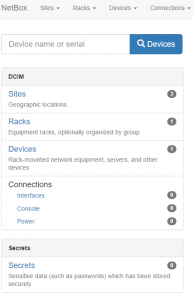DigitalOcean’s network engineer Jeremy Stretch was on a mission to find a provider-grade IP address management solution. The search was unsuccessful, so Stretch and his team set out to build the cloud company’s most popular open source project, NetBox.
NetBox was first announced in June 2016, and it is targeted toward network engineers, data center technicians and systems administrators. It is written in Python, using the Django framework and a PostgreSQL database. Go and Python clients are available for the tool’s API as well. The project is also open source, free, and provides network engineers with IPAM, DCIM, single converge database, Vlan management, and circuit provider management.
NetBox covers many areas of network management, but it does not provide network monitoring, DNS server, RADIUS server, configuration management, and facilities management. However, it can be used in populating external tools with the data needed to perform those functions.

One network engineer was looking for a fully comprehensive application for tracking network information when he discovered NetBox. Scott Hammersley said that a challenge for network engineers is having to keep up with information like VRF’s, Rack Elevations, and more. Plus, few applications combine all of the functionality features into one.
“NetBox is a swiss army knife, a gem, a diamond in the rough,” said Hammersley. “It combines all the features every person in the networking world needs, wants and should have.”
If you’re interested in giving NetBox a go, Hammersley has a few tips for consideration:
- Follow written documentation provided by DigitalOcean’s Stretch (they are lengthy with components needed in Linux in order to get the solution to work)
- Build a virtual machine to install/configure
See the installation guide for help getting NetBox up and running quickly.
Top 5 projects trending on GitHub this week:
#1. Chromeless: Chrome automation made simple. Runs locally or headless on AWS Lambda. This project moved up one spot!
#2. The JS Way: The JavaScript Way book
#3. Open Source Flash: Not everyone wants Flash to disappear. Featured in this SD Times story.
#4. What the f*ck JavaScript: A list of funny and tricky JavaScript examples
#5. What happens when: An attempt to answer the age old interview question “What happens when you type google.com into your browser and press enter?”






